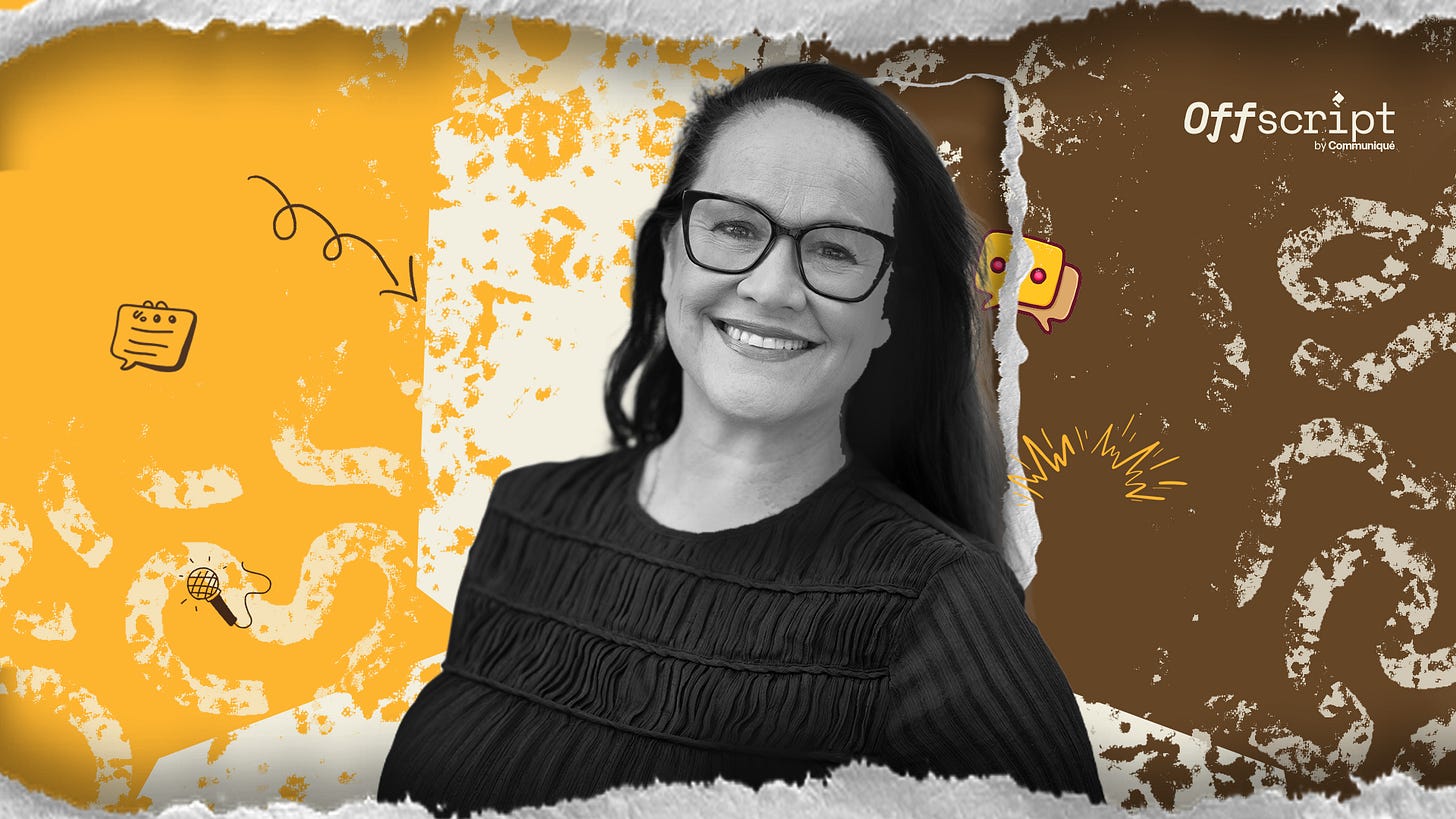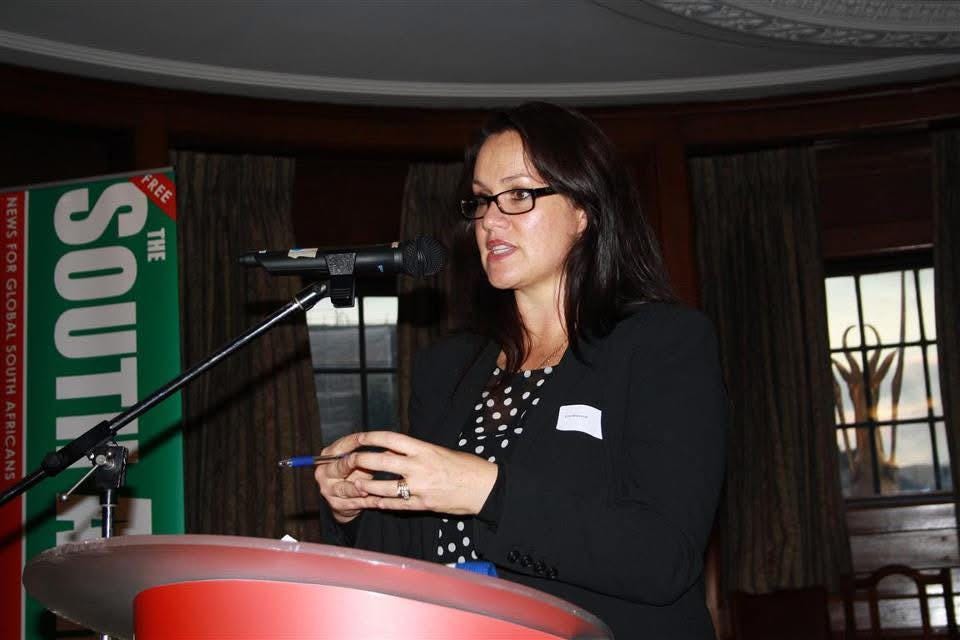Offscript with Lisa MacLeod
The FT Strategies Director on her career in digital transformation for media organisations.
“I look forward to retiring one day, and then I’m going to basically spend my whole retirement going through all the books that I’ve missed over the last 20 or 30 years.”
That’s Lisa MacLeod, the Director, Global News Clients at FT Strategies, thinking aloud about what her life will be when she retires from her career as a journalist turned media consultant.
MacLeod has spent decades helping newsrooms around the world, from The Financial Times (FT) in London to News24 in Cape Town, learn how to survive and adapt to digital change. But when she talks about journalism, she sounds less like a strategist and more like an anthropologist. “I’ve realised a lot of my work is anthropological,” she says. “It’s about observing how people and organisations respond to change — and helping them think differently.”
It’s a fitting description for someone who studied journalism and anthropology at Rhodes University in South Africa’s Eastern Cape, two disciplines that now seem inseparable in her life’s work.
MacLeod grew up in East London, a small port city on South Africa’s coast. When Macleod got into Rhodes University in 1991, Nelson Mandela had just been released from Prison.“I grew up in apartheid South Africa,” she says. “A lot of things that seemed normal then — like Black South Africans not being allowed into our suburbs at night, I only realised later were far from normal.”
At Rhodes University, where she studied journalism and anthropology, South Africa’s political transformation and her own intellectual awakening happened side by side. The campus buzzed with debates about freedom and democracy; protests and marches became part of student life. MacLeod absorbed the urgency of that moment, learning not just how to write the news but how to read society.
Her choice to pair anthropology with journalism was deliberate. Growing up on National Geographic and her parents’ novels, she had developed a fascination with people and how they behave in groups. Studying anthropology offered her a lens to understand culture; journalism gave her a way to document it. Together, they became the foundation of a worldview that would later shape her career.
After university, MacLeod joined The Daily Dispatch, a small regional paper known for its tight-knit newsroom. Her early assignments were light and lively: features about music, local culture, and community life. Then she was moved to the news desk. There, the work grew heavier. “I quickly realised I didn’t have the right temperament for hard news,” she admits. “I had to interview people who had just lost family members, and I found it very emotionally draining. You have to be really tough for that.”
She soon realised she was less drawn to breaking stories and more to shaping them. Editing came naturally; spotting gaps in structure, sharpening angles, helping other writers find their rhythm. That shift from reporter to editor was the first major turning point in her career. It revealed a strength that would come to define her professional life: the ability to help others adapt, refine, and grow.
Her next role after The Daily Dispatch was to be an editor at Business Day, a prominent newspaper in Johannesburg. She quickly rose through the ranks to become Managing Editor within six years of working there. Her work at Business Day earned her a fellowship at the Poynter Institute in Florida, followed by a short-term secondment at the Financial Times in London, which led to a permanent move to the UK and a position at the “pink paper.”
Her first assignment at the FT was not glamorous: help roll out a new digital publishing system. But that project became the launchpad for her career in digital transformation.
“When I think about digital transformation, for me, it’s really about helping people think differently,” she says. “You’re asking journalists to change habits built over decades. You’re changing how they see their work.”
At the time, the FT still printed multiple international editions every day. The internet was young; smartphones didn’t exist. “We had to figure everything out as we went along,” she says. “It was dramatic, fascinating work — and I had a front-row seat to all of it.”
Her background in anthropology gave her a rare lens for understanding what was happening. It was like watching a tribe forced to evolve overnight. “Journalists are tribal people.” And the rituals of the newsroom tribe, the hierarchy, the language, all of it had to change.
After 11 years at the FT, and moving up the ladder to be the Managing Editor, she called it quits and moved back to South Africa for family and personal reasons: She wanted her daughter to be close to her parents. While there, she worked for two of the biggest media companies in South Africa.
She led major change projects at News24 in Cape Town and Tiso Blackstar Group, now Arena holdings, the parent company of Business Day in Johannesburg. “I came back to South Africa somewhat like a visitor from the future,” she says. “The UK was about ten years ahead on digital, so I could say, ‘Here’s what works. Don’t waste your time on that.’”
Her experience convinced her of one thing: Africa’s journalism challenges are not just technological but structural. “One of the reasons African publishers struggle,” she says, “is because people can’t easily go work abroad and come back with new skills. If it were easier for Africans to move between markets, we’d see faster progress.”
MacLeod eventually returned to the UK. Back in England, she took on consulting work, including with Women in News, a global program under the World Association of News Publishers. “They work across Africa and the Middle East, helping women journalists grow in leadership,” she says. MacLeod developed and taught The Digital ABC, a course that helped journalists understand the economics and mechanics of digital publishing.
She soon found herself back in the FT family, this time not in the newsroom but in FT Strategies, the group’s consulting arm. “I called my old colleague at the FT who was setting up the division and said, ‘Please take me back,’” she recalls. “FT Strategies was perfect for me. It lets me draw on everything I’ve learned, in different jobs, countries, and crises — and use it to help other publishers thrive.”
She now works with news organisations across the world, including in Kenya and Uganda. “I almost made it to Lagos last year,” she says, laughing, “but there was a cholera outbreak.”
After decades of steering newsrooms through print decline and digital disruption, MacLeod still looks forward with optimism. “I’m working on a project to help strengthen local journalism in South Africa,” she says. “I’m hopeful it could serve as a blueprint for sustainability anywhere in the world.”
And one day, when she finally slows down, she’ll return to her first love — reading. “I think we’ve lost our ability to concentrate because of mobile phones,” she says, a little wistfully. “But I’ll get back to it. When I retire, that’s what I’ll do — just read all the books I’ve missed.” It’s a fitting plan for someone whose love of books led her to transform the way stories are told and shared.




